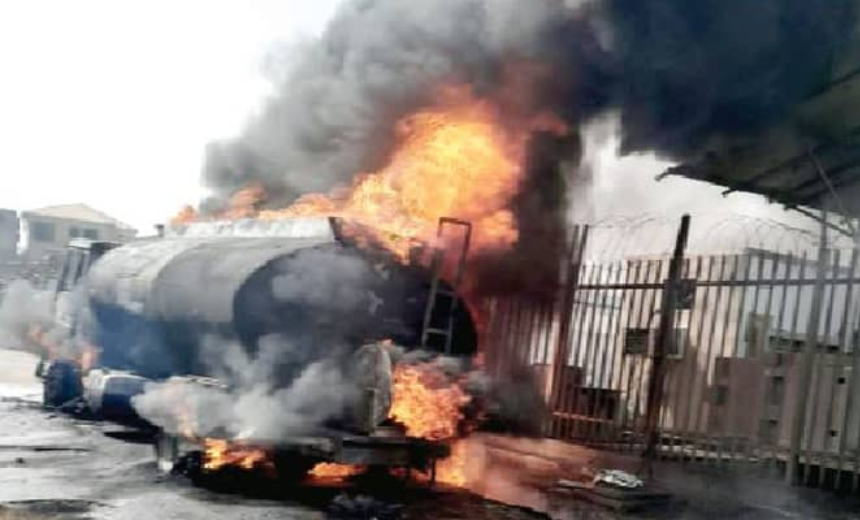Once again Nigerians are mourning a preventable loss of lives as no fewer than 35 persons have been confirmed dead while about 40 others sustained various degrees of injuries from a petrol tanker explosion while scooping fuel in a community of Niger state.
According to eyewitnesses the accident occurred at around 11am at Essan and Badeggi communities between the Bida to Agaie road in Katcha local government area of the state.
It’s the latest of such incidents in the state, as a matter of fact it’s the second incident in the same area in one year.
Chief News Editor Peter Okwoche Looks At This Most Recent Incident And Why Nigerians Are Not Learning From Past Episodes
The Essan and Badeggi communities in Katcha local government area of Niger State are in mourning. They are the latest victims of a deadly tanker explosion in Nigeria.
At least 35 people are known to have been killed and 40 others severly injured in the deadly furnace created by the blast.
The tanker had been carrying fuel from Lagos to the northern part of the country, when it overturned on Tuesday.
As villagers went to scoop from the resultant spillage, a fire was ignited and there was little those in the vicinity of the overturned tanker could do to escape.
It has become a recurring story in Nigeria.
In October last year, a fuel tanker explosion killed 153 people in Jigawa state, north-west Nigeria.
In January this year, a truck carrying about 60,000 litres of petrol overturned near Suleja, also in Niger state, killing at least 86 people and injuring nearly 70 others.
Nigeria’s Federal Road Safety Corps or FRSC reported over 1,500 tanker crashes in 2020 alone, causing 535 deaths and over 1,100 injuries.
In short the latest incident is tragically consistent with a recurring risk — overturned or crashed fuel tankers plus crowded bystanders plus ignition source equals mass casualties.
All the affected victims were scooping spilled petroleum products from the tankers when they exploded,
So what factors amplify the risk of such catastrophic incidents? Here at AIT_On_line, we have uncovered a few:
One: Spillage & public reaction:
A tanker overturns, spills fuel, people perceive an opportunity for use or resale and they crowd the scene. That gathering increases casualty risk exponentially.
Two: Ignition sources. In the January incident, it was
a generator being used to transfer the fuel in the overturned tanker into another, that caused the explosion. In other cases, some of those scooping the fuel, use metal buckets which could scrape against the asphalt and cause a spark.
Three: Road & infrastructure risk: The road where this accident occurred is heavily used by tankers, linking Lagos and northern Nigeria, with known maintenance problems. Poor road conditions, heavy‑vehicle over‑use and driver fatigue all contribute.
Four: Transport model: Nigeria still relies predominantly on road transport of petroleum products rather than pipelines or rail; this increases the exposure to tanker‑accident risk.
And five: Poverty and desperation: The sight of free fuel flowing from a crash appeals strongly in poor communities. In many of these incidents the victims are local residents, often scooping fuel.
So what needs to be done to tackle this spate of tragedies?
For one there must be more Public education and awareness: Urgent campaigns to stop people from approaching crash‐sites, especially tankers.
Stronger enforcement: The moment a tanker overturns, cordon off the area, stop looters/collectors and create safe perimeters.
Road and infrastructure upgrades: Particularly high‑risk routes like the Abuja–Kaduna corridor and roads in Niger State must be rebuilt, resurfaced and monitored.
And Emergency‑response capacity: Rapid firefighting, burn‑unit readiness, evacuation procedures. The faster the response, the more lives saved.
And then long-term, Alternative conveyance and spill containment methods must be considered and built.
(Editor: Anoyoyo Ogiagboviogie)








